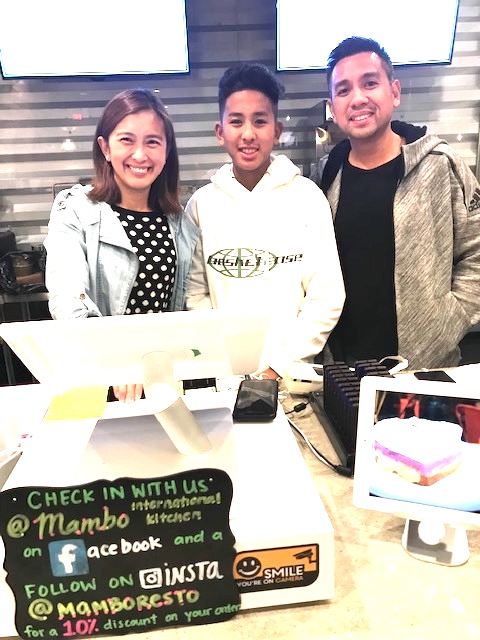Home schooling gaining ground among Filipino families

Sebastian Magsaysay, 13, is now grade 7 at Mullholland Middle school in LA after graduating from elementary home school taught by his mother, Donna. INQUIRER/Dante Ochoa
LOS ANGELES — Second-grader Alessandra Magsaysay religiously wakes up every day at 7 a.m., prepares for her classes and, avoiding the usual busy drive to school, walks a few steps to her “classroom” at her family’s modest home in the San Fernando Valley. She’s among the growing number of school children in the U.S. who get their early education from their parents or other relatives at home.
In fact, all four children of Raymond and Donna Magsaysay, immigrants who arrived in 2004, have been enjoying this non-traditional approach to education from childhood. They avoid the hustle of a congested freeway on the way to regular brick and mortar schools. The children from the lineage of the late popular Philippine President Ramon Magsaysay, are among the estimated two million children (in grades K to 12) who are home-educated in the U.S.
According to a research conducted by Dr. Brian Ray of the National Home of Education Research Institute, “it appears the homeschool population is continuing to grow at an estimated 2% to 8% per annum over the past few years.”
“Homeschooling is really gaining ground among families here in San Fernando Valley,” said Donna, 40, who knows of at least a dozen Filipino families conducting their own classes among their children.
It doesn’t take a master’s or doctoral degree to be a home school teacher; but it does take a lot of dedication and interest in research, Donna explained. “Actors, athletes, children of business people and diplomats who have to travel a lot, do it and there are no constraints to their learning and pursuing further studies later in colleges and universities.”
The Magsaysay children’s teacher and “principal” has been their mother.
“We didn’t plan to school our kids at home,” said Donna, but “dire circumstances” forced them to seek an alternative education for their eldest and, it turned out, for the rest of their children. Their eldest son, Vito, had an unpleasant experience as an 8-year-old in third grade, being picked on by a teacher at a local public school.

Donna Magsaysay, her son Sebastian, and husband, Raymond, at the family’s restaurant in Northridge, California. INQUIRER/Dante Ochoa
Friends from church said a regular school might not be a right fit and suggested home schooling. The task was at first daunting, but Donna persisted by learning the innovation by browsing the internet. Questions like “Can you homeschool in California?,” “What are California’s homeschool laws?,” and “What kind of homeschooling support is there for me?.”
Vito and his two brothers completed their elementary grades under the tutelage of their mother, graduating to the next school level. Vito, now 22, is a sophomore taking up Nursing at Santa Monica College; Juliano, 17, passed state tests to move on to El Camino High School; Sebastian at 13, was accepted at 7th grade level at the Mulholland Middle School.
They all hurdled the standardized Achievement Tests to be accepted at the regular schools and colleges. The youngest, Allesandra, 8, is in second grade, reading at a fourth-grade level, based on state testing. She’s’ at the third-grade level in English.
“My mom teaches very well,” says Sebastian whose ambition is to follow his brother to the highly rated El Camino Real Charter High School and to graduate from a university. “She is strict but we get to chill at home and go to after-school activity like martial arts and music to be with friends.”
The home school child is allowed to focus on a field of specialty like math or science, music, among others, and the parent-teacher follows a specific curriculum for their fields of interest.
Donna follows “Inspire Charter School” curriculum, which is state-accredited. She said there is a budget of $2,800 for every child in the home program and public schools to fund school supplies, books and related expenses. This fund also supports after-school enrichment programs from dance, martial arts, to math and science, field trips and other extracurricular activities. For her kids, being home-schooled have not deprived them of social activities because of interaction among their peers during field trips and after-school events.
There are at least three statewide home school associations in California: California Homeschool Network (CHN); Christian Home Educators Association of California (CHEA); HomeSchool Association of California (HSC). These associations are created to provide legal, social and informational support to families choosing to teach their children at home.
Actively involved in their church, the Magsaysay children enjoy the company of friends during weekends as well as frequent gatherings with families.
Donna studied Business Management from the College of the Holy Spirit in Manila and finished Early Childhood Education and Montessori Learning. Her husband owned and managed a construction business specializing in remodeling. Currently, they run a restaurant in Northridge called “Mambo,” which offers rice bowls and fusion dishes from the Philippines, Korea, Hawaii, Mexico and the Mediterranean.
“We meet once a week with home schooling cooperatives to share and exchange ideas.”
How does one take a parental role and shift to a classroom teacher mode? “Parents have to be consistent with rules,” Donna advised. There needs to be regular wake up and bed times, and no television during the week. What is most important are the values that we impart to our children and they are observant whether we practice what we teach. We have religion as a subject and the basic reading here is the Bible.”
She said further: “We combine books and online reading during the day and they do their work individually. Based on the children’s curriculum or grade, the state has a set of reading requirements; and tests that they have to take and complete.” All her kids always scored at the Advanced Placement (AP) level.
The Magsaysay are articulate, responsive, respectful yet expressive of their views. Some of them occasionally help at the Mambo counter, taking customer orders during their spare time. Allesandra sometimes brings her homework to the restaurant and gets tutoring from her mother, from a vacant corner table. “At her age, she knows how to interact maturely with the restaurant staff,” her mother smiled.
“We have not organized any formal group among ‘home schoolers,’ but our families do get together regularly as do regular schools and that is most rewarding for us parents and our classes,” Donna said.







